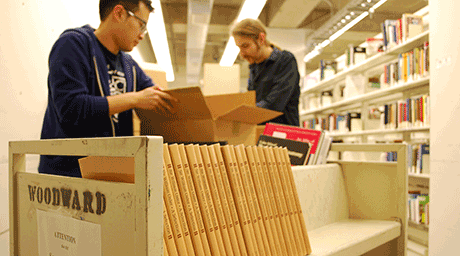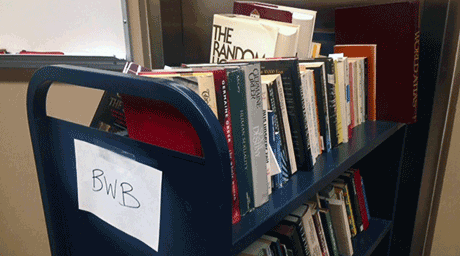UBC Library is contributing to literacy in communities around the world and to environmental sustainability – all thanks to its partnership with Better World Books.
Better World Books (BWB) is a social venture that collects used books and textbooks from nearly 3,100 libraries across the U.S. and Canada for reuse or recycling. Books are distributed through one of three channels: they are donated to literacy initiatives around the world; sold through online booksellers; or recycled.
The Library’s partnership with BWB extends across the Vancouver and Okanagan campuses. Since 2009, UBC Library has contributed more than 38,000 books, the majority of which were recycled. That’s just over 53,000 pounds, or 26 tons, of books that have been diverted from a landfill. Around 15,000 books were able to be reused.
“It’s rare, but we do sometimes receive materials that have mold, and need to be disposed of in other ways,” says Arielle Lomness, a Librarian at UBC Okanagan Library. “But at least we know they are being recycled in the right way.” Lomness says the majority of the materials sent from the UBCO campus are repurposed or reused.

Staff at UBC Vancouver campus packing up books.
BWB provides metrics so libraries can see how their contributions are helping the environment. For example, Rudi Traichel, a Technical Services Librarian at the Vancouver campus, shares that since 2009, the Vancouver campus has saved around 240 trees and eliminated around 31,000 pounds of greenhouse gases by saving books from landfills. The UBCO campus contribution has saved 379 trees thus far.
Since its inception in 2002, Better World Books has donated 23 million books, and reused or recycled more than 260 million books. The organization also collects books to support programs like Books for Africa, Room to Read and The National Center for Families Learning – a program that addresses adult literacy in the U.S. They also collect metal shelving, with more than 900,000 pounds of shelving reclaimed for use in the past fifteen years.
The Library’s initial goal with the program was environmental sustainability, but the impact of this partnership is proving to be broader than anyone could have imagined.

UBC Okanagan campus Library prepares books for their shipment.